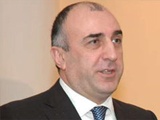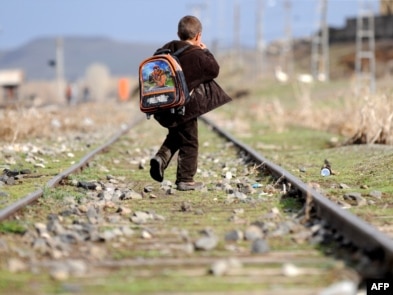 Armenia — Foreign Minister Eduard Nalbandian meets U.S. Secretary of State Hillary Clinton in New York.
Armenia — Foreign Minister Eduard Nalbandian meets U.S. Secretary of State Hillary Clinton in New York.U.S. Secretary of State Hillary Clinton pressed Armenia and Turkey to complete the normalization of bilateral relations within a “reasonable” period of time as she met with the two countries’ foreign ministers late on Monday.
Clinton praised both governments for their “strong commitment” to pushing forward the process hailed by the international community and United States in particular. “I want to reiterate our very strong support for the normalization process that is going on between Armenia and Turkey, which we have long said should take place without preconditions and within a reasonable timeframe,” she said after meeting Nalbandian.

U.S. — Secretary of State Hillary Clinton (L) meets with Turkish Foreign Minister Ahmet Davutoglu (R) during a bilateral meeting in New York, 28Sep2009
Clinton later delivered a similar message to Davutoglu, according to U.S. officials cited by Western news agencies. “When we say reasonable ‘time frame,’ we mean just that, that it’s not just the process that we want to see,” U.S. Assistant Secretary of State Philip Gordon was reported to tell journalists. “We welcome the process, but we also want to see a conclusion to the process and that’s what we’re underscoring when we say that.”
The U.S. officials’ message should have been heartening for official Yerevan which has long complained about Turkish linkage between the normalization of Turkish-Armenian ties and a resolution of the Nagorno-Karabakh conflict acceptable to Azerbaijan. Armenian leaders fear that Ankara could still avoid implementing two fence-mending agreements with Yerevan if international efforts to settle the dispute yield no breakthrough in the coming months.
The agreements, which envisage the establishment of diplomatic relations and the reopening of the Turkish-Armenian border, are due to be signed by October 14. The documents need to be ratified by the parliaments of both countries before they can take effect.
According to the Armenian Foreign Ministry, Nalbandian thanked Clinton for Washington’s strong support for the ongoing Turkish-Armenian rapprochement that began shortly after President Serzh Sarkisian took office in April 2008. Clinton underscored that support when she telephoned Sarkisian to discuss the process on September 19. It was their second phone conversation in a month.
In Gordon’s words, Washington hopes that Sarkisian will accept Turkish President Abdullah Gul’s invitation to watch with him the return match of the two countries’ national football teams that will be played in the Turkish city of Bursa on October 14. “We think it would be a good thing if he attended it, reciprocating the attendance of the Turkish president of the match when it was in Armenia,” the diplomat said.
“This is a difficult process that faces some political opposition in both places and it’s hard for both governments,” added Gordon. “It shouldn’t wait for other things to get done, or be linked to other things. It should go ahead.”
Nalbandian sounded cautiously optimistic on that score in his speech at the General Assembly earlier on Friday. “The process of the normalization of the Armenian-Turkish relations … promises to bear fruit despite all difficulties,” he said.





 A Turkish boy walks along railroad tracks disused since the closure of the Turkish-Armenian border. The new agreement foresees the border reopening.
A Turkish boy walks along railroad tracks disused since the closure of the Turkish-Armenian border. The new agreement foresees the border reopening.


